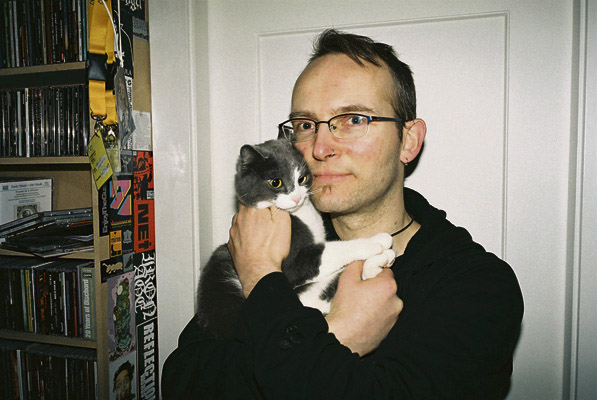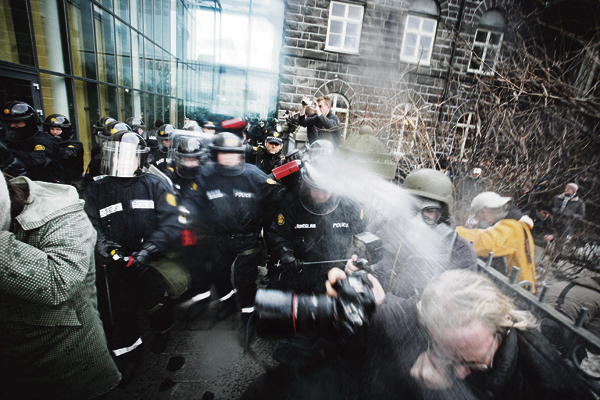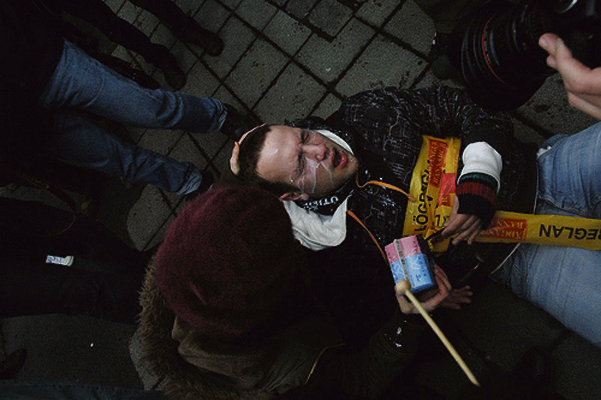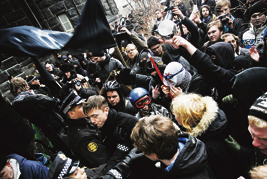“I don’t like being interviewed,” said Njáll with a sceptical air about his furrowed brow.
Shit, I thought. This isn’t going to be easy.
He let out a long, slow sigh, looking toward the group of young people who moments earlier had refused to speak with me, referring me instead to the young man who was himself now on the verge of refusal. “Fine. I have a few minutes.”
Standing in Lækjartorg on a particularly windy Saturday, the tall young man, dressed in earth tones, with an unruly head of sandy hair and a kind smile – in stark contrast to his peers who had a clear penchant for piercings, studded leather and hair dye – watched as people idled up to the white plastic pails on the folding table he manned and help themselves to the vegan food therein. Njáll explained how Food Not Bombs came to be a weekend staple in Reykjavík just about a year ago, after an American friend implored him to help launch a program modelled after that which had been running in Boston since the 1980’s. For the past year an ever-changing group of supporters amass in a private Reykjavík residence at 10 a.m. every Saturday to prepare vegan dishes from near-expired food that would otherwise be thrown away.
“We noticed for a long time there was a lot of over consumption in Iceland. The average Icelander is a very wasteful person and the companies are not making it any better,” the young man espoused. “We thought it would be a great community project to give the stupid lifestyle consumer people here a big fuck-you and serve this ‘unhygienic’ food here on the street to show other people and ourselves that food is not supposed to be a luxury that only the privileged can afford.”
Njáll is an anarchist; he said so himself.
What I heard in the windy square about Food Not Bombs was expected. It’s a well-known initiative and the anti-consumer sentiment that Njáll expressed was commonplace among some others of his kind that I had spoken with. But then the brow furrowed once more and through his lips passed words that I did not expect whatsoever.
“I wasn’t very interested in the protests [of last autumn and winter] because I found them very shallow, only about money.”
Did he just say that? He’s not interested in the now infamous pots-and-pans revolution that brought down the corrupt Icelandic government? He thinks the movement that headlines the Iceland portion of the weekly “news and comments from the anarchists” distributed by Anarchy.no was shallow? What kind of anarchist is he?
“I feel that most people just wanted the profit to come pouring back in and they were protesting against the government for not bringing it to them,” he explained. “But that’s not something someone can bring to you.”
But, Njáll is an anarchist! As such, he should be championing the great success of the protests. It was, after all, his fellow anarchists who were pivotal players in commencing the citizens’ movement against the government. They had foreseen the grim future in every highly inflated currency trade made and in every square centimetre of highlands flooded. They taught the common folk how to resist, how to engage in civil disobedience – local anarchist Siggi Pönk’s own book on direct action and civil disobedience appears a great success. Once the government had toppled, they persisted and squatted a house on Vatnsstígur to stick it to the capitalistic man that survived the regime change. In fact, they did that three times for posterity’s sake.
If Njáll is a card-carrying member of this socially active group – he did openly call himself an anarchist, after all – he should subscribe to the same ideals, support the same initiatives and applaud the same means and ends without question. Or should he?
Let’s start at the beginning, often a good place to start
Before you can understand Njáll and the people calling themselves ‘anarchists’ in and around Reykjavík you first must understand the basics of what anarchism is and where it comes from. Firstly, anarchism is political in nature and considers the state, the man, hierarchy, compulsory government, etc. to be a scourge on society, entirely unnecessary and harmful to the people within society. I got the feeling early on that journalists, however young and sympathetic to “the cause”, seem to be grouped in among those not to be trusted – the analogy of a tree falling in the woods making or not making a sound if nobody is around was given to explain that grassroots initiatives will happen with or without journalists, so we’re really not all that important. I’m expendable. Ouch.
“Community functions better when it has to take responsibility for itself, when we don’t trust on the state institutions for earning things,” clarifies Siggi Pönk. “To quote an old anarchist: ‘freedom is the mother of order.’ We have to be free, we have to organise, and if you look at anthropology you’ll see this is a natural phenomenon in all societies or communities. There is a social order through sanctions. Through negative and positive actions we learn how to behave. So we innately know how to behave within community.”
Historically, anarchist-like thought has been prevalent in the settlement of nations (primarily agricultural nations, like Iceland) and in Eastern philosophical thought, like that of Lao Tse in his Daodejing. Modern anarchist philosophy has its roots in post-enlightenment thought and has been attributed to William Godwin, who repurposed the negative term to stand for progressive economical and political concepts that are still attached to anarchism today. This is not to say that there is one train of anarchist thought, as anarchist beliefs differ greatly from one subscriber to the next. Some anarchists purport individualism, while others champion collectivism; some adopt communist thought and still others have libertarian tendencies.
Siggi Pönk, for example, chooses to pick and choose theories from a wide range of anarchist thought to create a lifestyle that suits him best.
“[I look to the] anthropologists pointing out that this really is what is going on – anarchism is the normal state of human communities – and then the theorists who are theorizing about anarchy as politics and then the romantic anarchists who are just ‘ahh, fuck everything, just have fun, that’s the natural way. Live your life!’ I mix all these together.”
The group that’s not a group at all but still kinda thinks like a group and looks like a group even though they’re totally not a group
“All of us are individuals. I think that is important to understand to start with,” began Swedish transplant Freyja in the community space of Kaffi Hljómalind. “We don’t have an organisation of five guys who run everything. We’re friends. We do things together. Some things I want to be a part of, some things I don’t.”
“People come and go; they’re not always the same. They do what interests them. It’s the meaning behind the actions that are common,” added Fotini, another foreigner taking an active role in Reykjavík’s anarchy scene.
“Of course we’re a group right now but we won’t be a group in ten minutes, we’ll be individuals,” contributed Vermundur. Reacting to the look of slight confusion on my face – people who work together to achieve common ends after being brought together through shared ideologies are just about as textbook ‘group’ as it gets in my experience, and such anarchist organisations as Aftaka and Öskra do exist… and they’re definitely groups – the Icelander joked “this is going to take a while, we had better start thinking about dinner!”
I’m not going to lie, the whole non-group/organization concept is an issue for me. I, personally, had a hard time grasping their claim of not being organized. I get that they’re not members of some anarchists union in which I could be Anarchism Member No. 426902 if I keep up with my monthly dues, but they have a system that must have taken some organization. Sitting in Hljómalind, these young people had a series of hand signals worked out to keep track of the order in which they wanted to speak (I was quickly told that it was not my responsibility to keep track when I felt like a teacher who had to point to students with raised hands); they have a private mailing list to circulate information amongst anarchists online; they (on an international level) send out a weekly mass e-mail to anarchists and other interested parties throughout Europe, the Grapevine included. That’s pretty damn organized, no?
Still, the anti-group concept the young activists are pitching is valid and any misunderstanding on my part was, admittedly, based solely upon semantics. Anarchists are not a group, at least not in an official sense. They are individuals with ideologies that are generally anti-hierarchical and anti-capitalistic in nature. Of course, not all anarchists will even agree on that and it has been noted that those calling themselves anarchists share little more than a vague family resemblance in most cases.
This lack of universality of thought among those calling themselves ‘anarchists’ is the very motive for asserting the non-group characteristic. Members of a group must be personally responsible, to some extent, for the actions of the group as a whole or members thereof acting on behalf of the group. Since the ideologies of anarchists sometimes overlap but can also find themselves at far ends of the social spectrum, it is in the interest of anarchistic individuals to remain as such and take responsibility for their actions alone.
“People who don’t understand the structure will see that the anarchists squatted a house and it was published on this website and then the next article on that same website is that someone shat on a ballot. And people will ask, ‘are you really involved with these people?’ This is a very common discussion that I encounter,” says Vermundur. “Like ‘oh, there is a photo on that website where you are stealing a house and I read about it and there are some good points being made. But then you’re hanging out with the same people that shit on a ballot!? Something is seriously wrong with you!’ But, knowing the people does not mean that I approve of their actions. This is not a group. A group will always be judged on their actions as a group, but these are just individuals that share ideas some of the time, not all of it.”
Sitting in that same community space, adjacent to the anarchism library that he established and maintains, Siggi Pönk shed some light on the non-group of local anarchists. “They don’t have organised meetings, they don’t have a name. It’s a movement. Iceland functions like a village so you don’t need to have a phone network or e-mail network to get the people together and get things organised. The anarchist movement is the same way. We have e-mails where we exchange ideas of what to do next. If somebody has an idea and says, ‘hey, I want to do this, who wants to join me? Come meet me here.’”
Anarchism flourishing in the ‘village’ of Iceland is not surprising in modern times. Especially considering that anthropologists have cited ancient Iceland as an anarchist settlement. Harold Barclay, a noted anarchist and anthropologist and author of People without Government: An Anthropology of Anarchy, writes of Iceland’s chief system, in which leaders (Goðorðsmenn) were not granted a set period of time to rule based upon elections, rather they could remain in power so long as they held the favour of the people. This was done through fair and ethical rule and not making a show of the power they held.
Today, the anarchists believe, power is easier to achieve by those least deserving of it, and it is dangerously wielded. Siggi Pönk explains: “People who do police work or have more power than the public, they are not in any way more trustworthy than any one of us. And the people in government, they’re as stupid as me, they make the same mistakes as me but I don’t have power. My mistakes in life don’t affect the rest of the world.”
Got a problem? Don’t just sit there, do something about it!
The minor mistakes of an individual may not have widespread consequences, but that is not to say that the actions of individuals are equally narrow in scope. Group or no group, anybody observing anarchists within Reykjavík or elsewhere in the world is sure to note that they are more motivated by their ideologies than the average citizen. Many people see something wrong within their community and they complain within their group of friends or to their families, making critical statements but doing nothing more to affect change and remedy what they see as a dysfunction in their society.
Anarchists see a problem, meet other people concerned with the same problem and then they try and do something about it. These young people I spent time with, trying to understand their motivations and beliefs and goals, impressed me to no end and made me feel terribly inactive on the social scene – I’m prone to bitching about communal issues that rub me the wrong way, not getting out on the streets and acting on my sentiments in hopes of changing the system.
As Freyja eloquently puts it: “If you want to change something don’t just get somebody who is higher up than you to change it, get out on the fucking street and change it yourself in some way. Start working for your community rather than begging somebody else to work for your community.”
Siggi Pönk matches this sentiment in the context of the protests that rocked Iceland in the past year and the input he received from those less active within the community.
“All these people who are telling people how to do things better, why don’t they do it themselves? With the actions after the crash but before the big protests happened people were always giving us points on what to do next. ‘Oh, you should protest over there, you activist guys.’ But we’re tired, too. This is what happens when people are used to being served. Someone to take care of the garbage for you; someone to take care of your protest for you. They want people to take care of their anger for them so they don’t have to do it themselves. It pisses a lot of us anarchists off sometimes. ‘I’m not doing it myself, but you should keep on doing it.’”
It’s probably easy for most to relate to the inactive commoner, bogged down by the feeling of being a David taking on a Goliath. Each of us is just one person, what can one person do? This mentality, Siggy Pönk believes, is what drains the passion from a lot of anarchists and activists pre-maturely.
“I don’t believe in a revolution as something happening next week, I believe it’s about learning new ways of going around each other. That’s why I’m sowing the seeds. When I started publishing books I thought this was going to have an affect some fifty years after I’m dead. If you’re an activist you’re just going to burn out if you think your activism is going to save the world next week. So I just look at myself as part of a movement that has been going on since the beginning of humanity.”
Happily ever after
Anarchism is a heavy subject. One can diligently read through every book on the subject in Siggi’s extensive library and still not have exhausted all the theories and considered all the sides to the concept. Anarchism, as it is being widely practiced in such a small place as Reykjavík, is a testament to how massive and elusive the philosophy is: individuals, sometimes coming together in pseudo-groups, sometimes sharing ideologies, sometimes with opposing opinions. Anarchism within a community, it seems, is like a living thing, growing and evolving and changing to suit equally amorphous ideals and goals. With this fluidity of meaning in mind and the realisation that anarchists, as individuals, have the free will to pick and choose their battles. I suppose Njáll fits the bill after all, regardless of being unimpressed with what is possibly Iceland’s most significant social-movement in recent history.
Njáll is an anarchist.
Meet Your Friendly Neighbourhood Anarchists!
 Siggi Pönk is a 41-year old heavy hitter in Reykjavík’s anarchy scene. Starting off as a young punk rocker, breaking windows at McDonalds and causing a general ruckus around town, Siggi has progressed in his ideologies and now maintains the anarchist library out of Kaffi Hljómalind. He has always been known to have a Jesus-complex, striving to save the world as best he can. Though he grew up on a farm, his vegetarianism and empathy toward animals prohibited him from continuing in the family business and, instead, is an ER nurse in Reykjavík.
Siggi Pönk is a 41-year old heavy hitter in Reykjavík’s anarchy scene. Starting off as a young punk rocker, breaking windows at McDonalds and causing a general ruckus around town, Siggi has progressed in his ideologies and now maintains the anarchist library out of Kaffi Hljómalind. He has always been known to have a Jesus-complex, striving to save the world as best he can. Though he grew up on a farm, his vegetarianism and empathy toward animals prohibited him from continuing in the family business and, instead, is an ER nurse in Reykjavík.
 ‘Freja’ is a Swedish girl in her early twenties. She moved to Reykjavík to study and has since found herself active in the anarchist movement. She was drawn to anarchism out of an urge to affect positive change within her society. “I want to live with people where we create a better society, where I don’t ask somebody else to do something for me. I don’t do things to fuck the police, why would I want to fuck with the police? I do it out of pure love for my society. It’s a dream of society where we show solidarity that brought me to activism. I want to be empowered to affect my society, not just vote every four years.”
‘Freja’ is a Swedish girl in her early twenties. She moved to Reykjavík to study and has since found herself active in the anarchist movement. She was drawn to anarchism out of an urge to affect positive change within her society. “I want to live with people where we create a better society, where I don’t ask somebody else to do something for me. I don’t do things to fuck the police, why would I want to fuck with the police? I do it out of pure love for my society. It’s a dream of society where we show solidarity that brought me to activism. I want to be empowered to affect my society, not just vote every four years.”
 ‘Njáll’ is an Icelander in his early twenties who has been actively involved with Food Not Bombs since its inception just over a year ago. He is not a student, he has no job, he collects no social benefits, and he spends the bulk of his time on his music and developing social projects. He was drawn to anarchism “because I see that in my relations to people that how I treat other people and how I am treated are not separated, they are the same thing.”
‘Njáll’ is an Icelander in his early twenties who has been actively involved with Food Not Bombs since its inception just over a year ago. He is not a student, he has no job, he collects no social benefits, and he spends the bulk of his time on his music and developing social projects. He was drawn to anarchism “because I see that in my relations to people that how I treat other people and how I am treated are not separated, they are the same thing.”
 ‘Berglind’ is an Icelandic woman in her late twenties, with children and a high-maintenance cat that demands to be walked outdoors on a leash. She has always been anarchy-minded, opting to adopt a vegetarian lifestyle at the age of five and questioning the morality of women wearing fur around the same time. She forayed into active anarchy while living in Australia, when she was presented with the opportunity to participate in a protest in support of refugees. She was so touched by the dedication of strangers to making a change for struggling refugees that she continued to be involved in anarchist actions upon returning to Reykjavík. She calls herself a “green anarchal-communist with nihilistic tendencies.”
‘Berglind’ is an Icelandic woman in her late twenties, with children and a high-maintenance cat that demands to be walked outdoors on a leash. She has always been anarchy-minded, opting to adopt a vegetarian lifestyle at the age of five and questioning the morality of women wearing fur around the same time. She forayed into active anarchy while living in Australia, when she was presented with the opportunity to participate in a protest in support of refugees. She was so touched by the dedication of strangers to making a change for struggling refugees that she continued to be involved in anarchist actions upon returning to Reykjavík. She calls herself a “green anarchal-communist with nihilistic tendencies.”
Pics unrelated. Except the top one. That really is Siggi Pönk.
Buy subscriptions, t-shirts and more from our shop right here!















